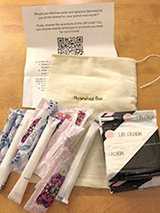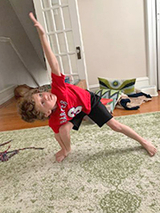CHOP Cares Community Grants Awarded Spring 2020
The CHOP Cares Community Fund and Grants Program awards grants to CHOP employees to cover expenses for health-related projects that fulfill specific needs in one of the many communities CHOP serves. For the first time, in addition to CHOP Cares Grants, the program includes EXCEL grants, which are larger awards. Read more about the CHOP Cares Community Grants awarded in spring 2020 and how they impacted children and families in the community.
CHOP Cares Excel Grants
Gender & Sexuality Development Clinics go virtual
Linda Hawkins, PhD, MSEd, LPC, Gender Clinic Program Director
The never-ending local, regional and national harassment that transgender, gender-non-binary and gender expansive children and their families face requires a safe group space where families can join together to heal and grow. Our monthly in-person meetings in Philadelphia prior to the pandemic were getting too large to be effective, and we planned to add meetings to King of Prussia and New Jersey. Due to COVID-19, we switched to serving this community with virtual support groups. A total of 544 children, youth, parents and extended family members attended the expanded Saturday and Thursday groups. Going forward, virtual groups will continue and, when it is possible, in-person groups will resume in Philadelphia with additional groups meeting in King of Prussia and Voorhees and Mays Landing, NJ.
Healthy Hearing Community Education Program
Frank Wartinger, AuD, ABAC
Early hearing screening can get children the help they need sooner, before they fall behind in speech and language development, social development and academic achievement. However, access to screening can be a challenge for some families. CHOP’s Healthy Hearing Community Education Program (HHCEP) conducted hearing screening events at nine Delaware County schools in fall 2020. Screenings were completed for a total of 180 3- and 4-year-olds who met eligibility requirements for enrollment in a Pennsylvania Pre-K Counts program (family income up to 300% of poverty, diagnosed disability or developmental delay, or whose primary language is not English). All families of children tested were given the results, and families of the 25 children who did not pass the screening were provided with additional guidance for follow-up testing and management. HHCEP also created and distributed 250 age-appropriate activity booklets that teach basic hearing health awareness concepts in an engaging, play-based manner with the goal of initiating life-long hearing protection habits.
CHOP Cares Grants
Fresh start: Increasing fruit and vegetable consumption among young children in West Philadelphia

Priyanka Joshi, MD, MS, and Brittany Van Remortel, MD, MPH
The grant supported a review of quantitative and qualitative data collected from surveys to develop a draft proposal for community-based intervention to increase access to and intake of fruits and vegetables, with the support of community food access and distribution organizations. The team established partnerships with Farm to Families and Food Connect to distribute boxes of produce to families seen at the CHOP Care Network Cobbs Creek primary care office who receive Women, Infant and Children (WIC) benefits. Delivery to 50 families started in August 2021 and will run for eight weeks.
La Comida Y Salud
Elizabeth Parks Prout, MD, MSCE
Even though 14% of children in Philadelphia are from Spanish-speaking families, there were not linguistically appropriate materials designed for childhood obesity prevention and treatment for those families. This project created, first, four workbooks and 20 individual topic handouts in English. They will be translated into Spanish and printed to be distributed to families in CHOP's Health and Well-being Clinic, the CHOP Care Network and to community partner organizations. Additionally, they will be available electronically for physicians throughout CHOP as a resource for their Spanish-speaking families.
Addressing menstrual hygiene needs for youth in local homeless shelters

Kaitlyn Petruccelli, MD, Shelby Davies, MD, Rebecca Golden, MD, and Noreena Lewis, JD
Women and girls living in homeless shelters have cited a lack of menstrual hygiene products as a reason they have missed school, work or job interviews as they don’t have the money to buy these products. The grant team partnered with CHOP’s Homeless Advocacy Program, HHI’s partner shelters in West Philadelphia and the Pediatric Residency Program to create and distribute more than 500 Period Packs. Each period pack had enough supplies for one menstrual cycle, and the team created personalized packs to meet the recipients’ needs and preferences. The pandemic limited personal contact with women and girls in the shelters, so the team pivoted to focus its education and advocacy efforts on providers and medical residents.
Minds matter: Concussion care for kids education and outreach initiative

Olivia Podolak
Recognizing and treating concussion as soon as possible bring the best outcomes. The initiative provided six educational sessions (virtual or in-person) with four local organizations that sponsor sports and recreation for children 12 to 18. Sessions were with youth, their parents and coaches. The sport organizations provided with sessions included: Philly Youth Basketball, Starfinder (soccer), Philadelphia Youth Sports Initiative (all sports) and Centro de Cultura, Arte, Trabajo y Educación in Norristown, PA (all sports). In total, over the course of 3 months, our program was able to reach 72 players, 48 coaches and 6 parents over the 6 sessions. Our initiative provided participants educational packets covering: facts about concussion, concussion symptoms, coping after concussion, information on participating in a concussion research study at CHOP, and a pathway to receive a concussion evaluation from CHOP’s Sports Medicine team. Extra handouts were given to the partner organizations to distributed to additional coaches and families.
Physical and emotional wellness: Raja Yoga’s School Outreach Program

Jennifer Riley
The overarching goal of this project was to provide children in underfunded public schools with methods of maintaining physical and emotional health through yoga and meditation. This became even more important during the pandemic, which typical outlets for relaxation and fun were limited. The community partner was Raja Yoga and Meditation Center of Greater Philadelphia, which brings yoga to underserved schools and senior centers. This grant supported live virtual classes during school hours for four kindergarten through 12th grade schools in Philadelphia, and four schools used pre-recorded sessions during their afterschool programs. A conservative estimate indicates 250 students participated over the year.
Thermometer education for maximizing parental partnership (Temp2)

Nooshin Waseh, MD
New parents are often unsure about the seriousness of fever in their newborn and many do not have a rectal thermometer. This project tackled both issues by providing one-on-one education for first-time parents during scheduled visits regarding how to correctly use a rectal thermometer, the definition of a newborn fever and what actions to take. The project expanded to include every new parent whose infants are seen at the CHOP Care Network South Philadelphia primary care practice. The grant funded more that 1,160 thermometers and 380 informational magnets (in English and Spanish) that were given to families.
Type 1 Diabetes Family and Children Education and Support Program
Jennifer Smith
For children with diabetes, meeting other kids with diabetes — and having their families meet other families in the same situation — can have a positive impact on their diabetes care and emotional health. COVID-19 necessitate a change from the planned in-person support group to virtual support groups. CHOP’s Diabetes Center planned two themed support sessions (Survival Guide to Quarantine and Spring into the Outdoors), each with separate activities for patients and their families. Each family that registered for a session received an activity kit to support the theme for that session. A total of 38 families registered; they also received a package of school supplies.